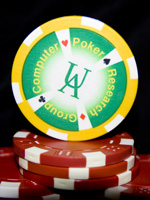The First Man-Machine
Poker Championship
Background
1992
World Checkers Champion Dr. Marion Tinsley
versus
Computer Checkers Champion Chinook (University of Alberta)
Chinook shocked the checkers world by earning the right to challenge for the official world championship title, defeating all other challengers (the rules were later changed to prohibit computer players).
The program's opponent was the invincible 40-year champion of the game, Marion Tinsley -- claimed by many to be more machine than man. During his 40-year reign, Tinsley lost a grand total of three (3) tournament games (another two if you include every simultaneous exhibition and casual game he played).
A computer malfunction probably cost Chinook the match, but not before winning two games against the greatest champion any game has ever seen.
In the 1994 re-match, Chinook became the first computer program to win a world championship title -- a fact recognized by the Guiness Book of World Records.
1997
World Chess Champion Garry Kasparov
versus
Computer Chess Champion Deep Blue (IBM)
Ten years after its historic victory, Deep Blue is still one of the most recognized names in the world -- human or otherwise.
The match captured the attention and the imagination of millions of people around the world. It was the biggest Internet event in history at that time. The web site received more than 74 million hits from spectators in 106 countries around the globe. According to an IBM executive, the event generated "250 million dollars worth of free favorable publicity" for IBM.
Although human frailty and an untimely blunder played a large role in the outcome, there is little doubt that chess programs have now surpassed all human players.
2007
World-Class Poker Professionals Phil Laak andAli Eslami
versus
Computer Poker Champion Polaris (University
of Alberta)
Can a computer program bluff? Yes -- probably better than any human. Bluff, trap, check-raise bluff, big lay-down -- name your poison. The patience of a monk or the fierce aggression of a tiger, changing gears in a single heartbeat. Polaris can make a pro's head spin.
Psychology? That's just a human weakness.
Odds and calculation? Computers can do a bit of that.
Intimidation factor and mental toughness? Who would you choose?
Does the computer really stand a chance? Yes, this one does. It learns, adapts, and exploits the weaknesses of any opponent. Win or lose, it will put up one hell of a fight.
Many of the top pros, like Chris "Jesus" Ferguson, Paul Phillips, Andy Bloch and others, already understand what the future holds. Now the rest of the poker world will find out.





